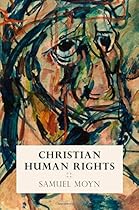Read Christian Human Rights (Intellectual History of the Modern Age) by Samuel Moyn Online
* Read ! Christian Human Rights (Intellectual History of the Modern Age) by Samuel Moyn ✓ eBook or Kindle ePUB. Christian Human Rights (Intellectual History of the Modern Age) The book ends with a provocative chapter that traces contemporary European struggles to assimilate Muslim immigrants to the continent's legacy of Christian human rights.. Pius XII's wartime Christmas addresses announced the basic idea of universal human rights as a principle of world, and not merely state, order. At the same time, West European governments after World War II, particularly in the ascendant Christian Democratic parties, became more tolerant of public expressions of religious piety

| Title | : | Christian Human Rights (Intellectual History of the Modern Age) |
| Author | : | |
| Rating | : | 4.67 (692 Votes) |
| Asin | : | 081224818X |
| Format Type | : | paperback |
| Number of Pages | : | 264 Pages |
| Publish Date | : | 2013-04-07 |
| Language | : | English |
A necessary provocation Ronald Osborn Samuel Moyn’s latest book, Christian Human Rights, is at once immensely informative, provocative, and exasperating. I found myself disagreeing with him on critical points on nearly every page but being forced to think and rethink why. I gave this book four stars not because I agree with his central thesis but because I think his book is a necessary provocation that will stimulate valuable debate and sharpen the arguments of those of us who are committed to excavating the sources of human rights and humanistic values in much earlier texts and lives than Moyn thinks should b. Jazz It Up Baby said Samuel Moyn and Christian Human Rights. As David Gordon stated in Mises.org on November "Samuel Moyn and Christian Human Rights" according to Jazz It Up Baby. As David Gordon stated in Mises.org on November 2015, Samuel Moyn could take for his own Lord Acton’s remark that “few discoveries are more irritating than those which expose the pedigree of ideas.” Moyn, a distinguished intellectual historian, has in several books argued that appeals to human rights in recent times reflect particular political and social contexts. He does not reduce the ideas of rights and dignity to these contexts, but his work tends to stress events rather than the inner logic of ideas.[1]In Christian Human Rights, he maintains that the Roma. 015, Samuel Moyn could take for his own Lord Acton’s remark that “few discoveries are more irritating than those which expose the pedigree of ideas.” Moyn, a distinguished intellectual historian, has in several books argued that appeals to human rights in recent times reflect particular political and social contexts. He does not reduce the ideas of rights and dignity to these contexts, but his work tends to stress events rather than the inner logic of ideas.[1]In Christian Human Rights, he maintains that the Roma. "This is a wonderful book which has helped me to understand a variety" according to Iveta Kazoka. This is a wonderful book which has helped me to understand a variety of issues that were previously either vague (for example, freedom of religion as a human right vs secularism) or where I did not even have a notion that I might be missing some key information:1) concept of 'human dignity' and its roots in reinvention of Christianity in 19This is a wonderful book which has helped me to understand a variety This is a wonderful book which has helped me to understand a variety of issues that were previously either vague (for example, freedom of religion as a human right vs secularism) or where I did not even have a notion that I might be missing some key information:1) concept of 'human dignity' and its roots in reinvention of Christianity in 1930s-19This is a wonderful book which has helped me to understand a variety Iveta Kazoka This is a wonderful book which has helped me to understand a variety of issues that were previously either vague (for example, freedom of religion as a human right vs secularism) or where I did not even have a notion that I might be missing some key information:1) concept of 'human dignity' and its roots in reinvention of Christianity in 1930s-1940s - previously I attributed the origin of this idea to post WWII period (legacy of Holocaust);2) idea of 'human personality' as an alternative to individualism, individualized rights (I was not aware of such a distinction);3) reasons f. 0s - previously I attributed the origin of this idea to post WWII period (legacy of Holocaust);2) idea of 'human personality' as an alternative to individualism, individualized rights (I was not aware of such a distinction);3) reasons f. 0s-19This is a wonderful book which has helped me to understand a variety Iveta Kazoka This is a wonderful book which has helped me to understand a variety of issues that were previously either vague (for example, freedom of religion as a human right vs secularism) or where I did not even have a notion that I might be missing some key information:1) concept of 'human dignity' and its roots in reinvention of Christianity in 1930s-1940s - previously I attributed the origin of this idea to post WWII period (legacy of Holocaust);2) idea of 'human personality' as an alternative to individualism, individualized rights (I was not aware of such a distinction);3) reasons f. 0s - previously I attributed the origin of this idea to post WWII period (legacy of Holocaust);2) idea of 'human personality' as an alternative to individualism, individualized rights (I was not aware of such a distinction);This is a wonderful book which has helped me to understand a variety This is a wonderful book which has helped me to understand a variety of issues that were previously either vague (for example, freedom of religion as a human right vs secularism) or where I did not even have a notion that I might be missing some key information:1) concept of 'human dignity' and its roots in reinvention of Christianity in 1930s-19This is a wonderful book which has helped me to understand a variety Iveta Kazoka This is a wonderful book which has helped me to understand a variety of issues that were previously either vague (for example, freedom of religion as a human right vs secularism) or where I did not even have a notion that I might be missing some key information:1) concept of 'human dignity' and its roots in reinvention of Christianity in 1930s-1940s - previously I attributed the origin of this idea to post WWII period (legacy of Holocaust);2) idea of 'human personality' as an alternative to individualism, individualized rights (I was not aware of such a distinction);3) reasons f. 0s - previously I attributed the origin of this idea to post WWII period (legacy of Holocaust);2) idea of 'human personality' as an alternative to individualism, individualized rights (I was not aware of such a distinction);3) reasons f. ) reasons f
Samuel Moyn maintains throughout his book an excellent and authentic vigor, demonstrating that the genesis of modern human-rights rhetoric can be found in a largely conservative Christian worldview that took shape in Western Europe (as well as in North America) in the 1940s."—Martin Conway, University of Oxford. "Samuel Moyn has emerged as the most important voice on the history of human rights in the twentieth century, and his book Christian Human Rights will be of interest to anyone who cares about human rights in general and the often forgotten context of the run-up to the Universal Declaration in particular."—Jan-Werner Müller, Princeton University"Christian Human Rights is consistently and stimulatingly opinionated
The book ends with a provocative chapter that traces contemporary European struggles to assimilate Muslim immigrants to the continent's legacy of Christian human rights.. Pius XII's wartime Christmas addresses announced the basic idea of universal human rights as a principle of world, and not merely state, order. At the same time, West European governments after World War II, particularly in the ascendant Christian Democratic parties, became more tolerant of public expressions of religious piety. In Christian Human Rights, Samuel Moyn asserts that the rise of human rights after World War II was prefigured and inspired by a defense of the digni
He is coeditor, with Jan Eckel, of The Breakthrough: Human Rights in the 1970s, also available from University of Pennsylvania Press. . Samuel Moyn is Professor of Law and History at Harvard University and author of The Last Utopia: Human Rights in History
Download Christian Human Rights (Intellectual History of the Modern Age)
Download as PDF : Click Here
Download as DOC : Click Here
Download as RTF : Click Here
